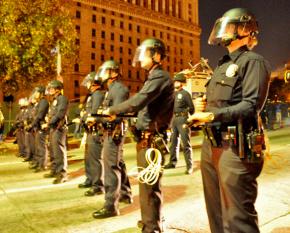Police invade Occupy LA
from Los Angeles on another Democratic mayor's crackdown on the Occupy protest movement and its right to peacefully assemble.
NOVEMBER 30 marked the end of the beginning for Occupy Los Angeles. The eviction of the 300-tent encampment outside City Hall came in a police raid organized with surgical precision and overwhelming force--some 1,400 police were involved, and nearly 300 people were arrested.
When the deadline for eviction set by Los Angeles Mayor Antonio Villaraigosa came two nights earlier, more than 3,000 Occupy supporters took to the streets to defend the encampment and the movement against economic injustice. That huge turnout stopped police from carrying out their operation to clear what we called Solidarity Park.
The infamously brutal LAPD concluded that the only way to clear the camp without complete chaos was to wait--and city officials were determined to make the eviction as "clean" and media-friendly as possible.
With about 1,000 supporters already in the park on the evening of November 29, police quietly established a 10-block perimeter to block new supporters from getting to City Hall. Just after midnight, squads of riot police burst into the park from nearby city buildings, including City Hall itself, and quickly segmented the crowd in the park and surrounding streets with rows of baton-wielding and tear gas-armed cops. Most supporters were driven away from the park in small groups, but hundreds were trapped in the police grid.

The arrest of 292 Occupiers took nearly four hours as police filmed each arrest and loaded handcuffed protesters onto waiting busses. Police in HazMat suites ransacked the camp, turning 30 tons of personal belongings and equipment into trash carted off to the dump.
While the police and mainstream media portray the eviction as a triumph of police nonviolence and tactical brilliance, reports of broken ribs and other wounds inflicted during the police attack--as well as video of the brutal arrests posted on the Internet--tell a different story.
THE BRUTALITY didn't stop with the raid and arrests. Handcuffed protesters endured up to eight hours locked on buses, not allowed to move, with zip-tie cuffs causing injury. With no physical relief, protesters were forced to urinate in their seats.
As one of the arrested, a writer, pointed out in an interview with the Pass the Relish website, this behavior in particular exposed the media's hype that police were respectful and nonviolent toward protesters as "simply untrue":
After I was arrested and handcuffed we were put on those buses and held in there for what we think was close to four hours. I've heard other groups were held in the buses even longer.
The buses were so crowded that some of us had to stand continuously the whole time. The biggest thing you will hear about are the painful handcuffs. I know people tend to think this just comes with the territory, but I have to say, four hours of coming up with methods to increase blood flow to your hands is nothing to laugh at. The police were also blasting Britney Spears and other pop music the entire time, kind of like the feds did at Waco and our military in Iraq more recently. It seems a little silly in retrospect, but at the time this was pretty unbearable.
I have to say, I was able to remain calm for most of this time, but it grew increasingly frustrating during the four hours because many of the protesters on the bus were having a hard time dealing with the situation. They were screaming, kicking the bus walls, it was a harrowing experience. I tried in vain to calm everyone down.
Away from the lights of the media, the courts then set about punishing Occupiers for exercising their rights. Arrestees were slapped with $5,000 bail each for misdemeanor charges. Instead of being released with orders to return, as mandated by law, those detained were ordered held until arraignment, which took nearly three days for the vast majority. For most of this time, the activists were denied contact with lawyers or anyone else. Authorities refused to issue a list of those arrested two days after the raid.
And all of this was carried out even though nearly all of the charges are for unlawful assembly, which is not much more serious than a late parking ticket.
The attack on the LA encampment adds another name to the list of Democratic Party mayors--many of them with a reputation as among the most liberal officeholders in the party--who have been ready and willing to attack the Occupy movement.
Villaraigosa offered Occupiers the use of a city building and city-owned farmland if they would leave the City Hall encampment--and get out of constant sight of the media. But Occupiers rejected this attempt to channel the movement into an "acceptable" form. When the time came, Villaraigosa was perfectly prepared to order the LAPD to attack.
But the movement's assemblies have continued, and Occupy LA has already shown that is not going away, even if it has been evicted from its City Hall camp.
The December 12 call for demonstrations at ports up and down the West Coast--of Occupy activists alongside workers, the unemployed and students--provide a next step for struggle that won't be silenced by police pressure.


